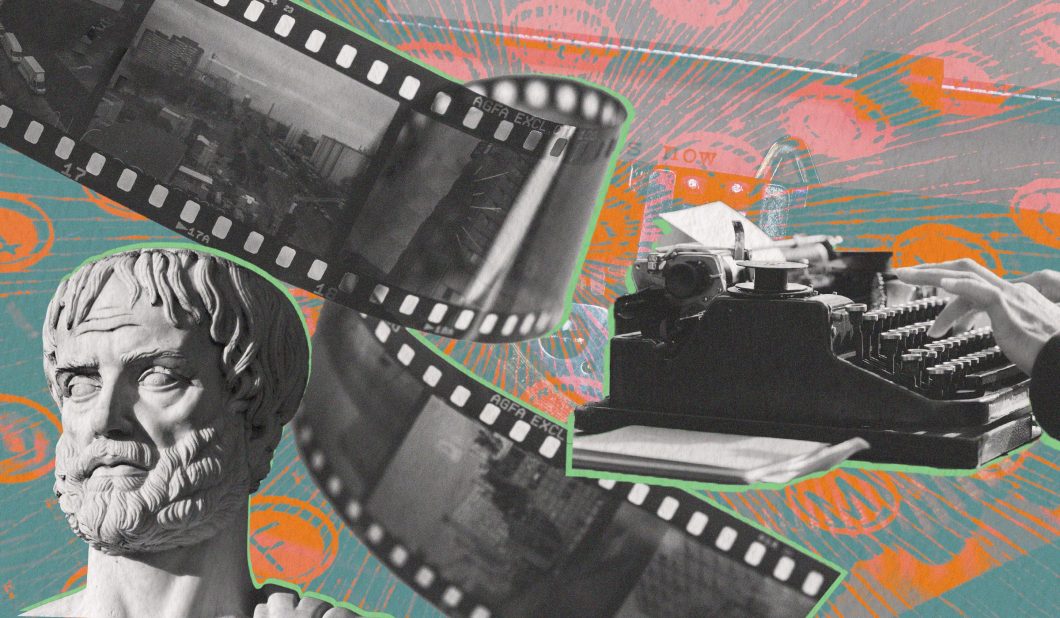The Silicon Valley nouveau riche are different from the rest of us; they are more grandiose.
Satire and the American Drama
As pluralists committed to the American experiment, Mr. Simon and I have much in common. He does not share with me the ignominy of being a professor, but Simon must admit the charge of being erudite. His understanding of the dramatic structure of our constitutional order is richly conceived. Kathy Eden has an excellent book called Poetic and Legal Fiction in the Aristotelian Tradition, which perfectly complements Simon’s expression of how politics and culture interlock: “Since Aristotle it has been understood, though perhaps underappreciated, that the very structure of civic life is … founded on the same rhetorical structures and devices as the drama.”
For Simon, to engage in serious political debate is to engage in a tragic agon, because, when worthy opponents clash, incommensurable goods are at stake. But when “heroic narcissists” clash, framing their agon as one of Good versus Evil, they escape the tragic gravity of planet Earth, blasting off rhetorically to the lunar battlefields of melodrama. As a satirist, I find these flights congenial to my taste. For instance, Simon’s interest in tragedy recalls a historian from my novel Old Enemies, Professor Harold Farbarker, whose obscure book on the Civil War, A Forgotten World of Tough Trade-Offs, is, in Simon’s sense of the term, too tragic in sensibility to please Professor Farbarker’s melodramatic colleagues.
Having come so far with Mr. Simon, I want to make a point that is not so much a dissent as an opening for further dialogue. Insofar as we Americans can claim to possess a tragic consciousness, it owes more to Shakespeare than to Aristotle. It is Shakespeare’s cadences that flood our high political rhetoric. Mr. Simon himself succumbs briefly (and happily, I am sure) to the influence of Julius Caesar. Lincoln’s love of Macbeth is particularly well known. Our sixteenth president took a great deal from it, including the study of moral absolutes at war in the political realm, but also, I would underscore, a personally unsettling image of a tyrant. Early in the opening act of the Civil War, Lincoln suspended the writ of habeas corpus in Maryland. He did not want to end the war battling Macduff in Dunsinane castle. I am suggesting that, like Lincoln, we inherit from Shakespeare a nuanced appreciation of Good and Evil: a spur to greater self-knowledge and, with this self-knowledge, a basis for inner conflict between one’s conscience and one’s duties as an American.
Like Mr. Simon, I’m averse to “the fantasy of total destruction of the existential enemy.” I’m not as sanguine, however, as he is about the “emotionally and morally complex, serialized narrative on our screens,” too much of which strikes me as a circus confection.
Mr. Simon is right to warn us against framing ordinary democratic conflicts in terms of moral absolutes. He rejects a “Manichean, dualist conflict in which the protagonists and antagonists are in a struggle that can only be ended by the total defeat or elimination of the opposition.” Likewise, he condemns “the overheated, apocalyptic rhetoric driving the most divisive and seemingly insolvable issues that polarize the nation—like Abortion, Guns, Race, and Identity.” The “apocalyptic rhetoric” surrounding “Guns, Race, and Identity” is fodder for the satirist, and I mock it with Rabelaisian relish whenever I can. But, with the abortion issue, it is my own ox being gored. As a Roman Catholic, I am a partisan. I prefer to satirize gung-ho abortionists of the Michelle Wolf variety: “And when you do try it, really knock it. You’ve got to get that baby out of there.” It seems to me that Wolf is a gloating defender of absolute evil, and that if our society tolerates too much of her Weird Sister act, tyranny and violence will prevail.
As a conservative novelist, I am always curious about the depth of our moral understanding. Being a Christian, I deplore Manicheanism, which is morally simplistic and a Christian heresy that dates to ancient times. If Manicheanism has taken root in America, it might be said that Christianity is to blame. Yet we cannot put our knowledge of good and evil back on the branch where we found it. Our historical panoramas are inevitably populated by angels and demons and by martyrs and madmen. Are we simply awash in fictions? Do we know ourselves well enough to make real delineations, to give honor where honor is due, to fight a just war, to tell appearance from reality, and true feeling from outward shows? These are hard questions of self-knowledge. I have been instructed, “Judge not lest ye be judged.” Also: “Let he who is without sin cast the first stone.” What can these sayings mean in our day-to-day lives?
In the final push, my artistic conscience demands an awareness of good and evil, which can inspire an apocalyptic vision, such as we see at times in Shakespeare. But Shakespeare is not, in Mr. Simon’s sense of the term, melodramatic. Let us agree, then, that melodramatic art is simply bad art, and that any serious artist, Christian or not, should guard against “overheated, apocalyptic rhetoric.” Still, the reality of good and evil cannot be swept under the rug. The answer in my case, what I’ve tried to do, is to temper the savage indignation of the satirist with an ethics of patience and charity.
We Americans are a breed of engineers: social engineers, computer engineers, genetic engineers, aerospace engineers. Our tragi-comic dilemma, as Hamlet remarks, is “tis the sport to have the engineer hoist with his own petard.” That is not melodrama: it is an inescapable irony of our modern age. It smacks of Luther (“go not to Wittenberg”). And yet, the series of reactions and counter-reactions that led from the bloody enthusiasms of the sixteenth and seventeenth centuries to the democratic gains of the Enlightenment must be regarded as a traumatic, tragic, and fruitful gain: as true progress. I admire the Founders very much: they rank among history’s wisest engineers. But not even they could ensure success indefinitely.
In Old Enemies, I’ve tried to remind my readers why this is so. I’ve satirized the American melodrama, which, in my interpretation, shows a liberal nation being hoisted with its own petard. Basically, then, I agree that the “tragedy of democracy is that it’s melodramatic.” Like Mr. Simon, I’m averse to “the fantasy of total destruction of the existential enemy.” I’m not as sanguine, however, as he is about the “emotionally and morally complex, serialized narrative on our screens,” too much of which strikes me as a circus confection. Moses Shea, my aging narrator, prefers the Latin Mass for its generous silences. He lives in two worlds, the computer-engineered world of international business, and a Christian world that survives by fits and starts. The humor of the situation comes at his own willing expense; for in his mind, healthy laughter is not meant to ridicule but to heal. If, as Mr. Simon suggests, comedy is “tragedy’s other face,” it’s because sometimes we need to laugh (as a former student of mine who is now a street urchin put it) at “the slings and arrows of outrageous furniture.”



